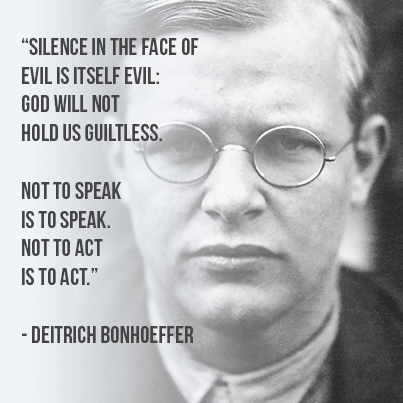Bonhoeffer: Pastor, Martyr, Prophet, Spy
Today I finished
Bonhoeffer:Pastor, Martyr, Prophet, Spy, by Eric Metaxas—the same author who told JohnNewton’s story in
Amazing Grace. Considering that Metaxas released thisbook about three-and-a-half years ago (it was ECPA's 2011 Book of the Year), I know I’m not exactly on the cutting edgeof book-review timing here. But who cares? This book has a timeless appeal, asit tells the story of a man who laid down his life for what he believed.
A friend insisted that the audio version of the book waspreferable to the print one, so I took her advice and learned passively as I droveto and from work and to appointments. I also learned some German pronunciation.I regret, however, that I had no way to underline in order to capture amazingquotes. Bonhoeffer had much wisdom, especially on the subjects of being single,heaven, ministry to young people, the dangers of mixing nationalism withChristian faith, about taking risks for the sake of the gospel, and about death and the Christian.
My favorite way to learn history is through the stories ofindividuals, whether real or fictional. And World War II is one of the eras Ifind most interesting—a fact I blame on Herman Wouk and the productions of “Winds of War” and “War and Remembrance” based on his books. Iespecially love the combination of deeply researched history and the world ofideas, including theological ones. Consequently, I loved this Bonhoeffer book, as it was partbiography, part history, part theology, and inspiration through and through.
Metaxas used sermons, letters, journal entries, lectures,the Barman Declaration, and news clippings to bring to life the events andpeople who made Bonhoeffer who he was: a musical, intellectual, theological,art-loving, Goethe-toting, cigarette-smoking teacher, theologian and Lutheranpastor. Bonhoeffer was among those who fiercely resisted the Nazis, to thepoint that he participated in a failed plot to kill Hitler. The young pastorwrote many volumes, including one on ethics, and he had a completely clear conscienceabout his efforts to stop the evil of the Third Reich. The book includes his rationale for how he could follow the God of the Ten Commandments ("you will not murder") while plotting a murder.
Bonhoeffer includesletters between the theologian and the fiancée he would never marry, as well ashis musings from prison—during which, by the way, he felt he had too little time to get any writing done(!).
The broadcast of his funeral, through which his parents learned of their son's death (they lost three to wars), included these words from an old familiar hymn:
For all the saints, who from their labors rest,
Who Thee by faith before the world confessed,
Thy Name, O Jesus, be forever blessed.
Alleluia, Alleluia!
Life is short, y’all.Spend yours well.
